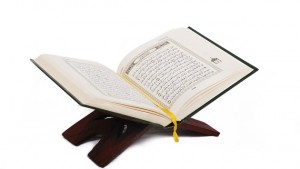Amongst those who claim that Muhammad (peace be upon him) did not write the Qur’an but got it from other sources are those who claim that he simply copied either the Apocrypha (Some of the scriptures not included in the canon from the Council of Nicea in 325CE that became known as the Bible, and later the “Catholic Version” of the Bible) and/or the Bible itself.
The first problem with this argument is that Muhammad (peace be upon him) as we mentioned earlier was illiterate and could not copy what he could not read.
Please keep in mind that Muhammad had (peace be upon him) a well-known impeccable character and that it was known that he was illiterate and that there is also no record of the pagan Arabs in Mecca accusing Muhammad (peace be upon him) of not being illiterate.
Had he not been illiterate, as the Qur’an itself stated, would this have not been easy to prove during Muhammad’s lifetime by his enemies who were eager to discredit him?
This fact alone shows that it was common knowledge during his lifetime that he was indeed illiterate and no one questioned this.
Secondly, even if one were to assume, for argument’s sake, that he could read, then the first Arabic translation of what is known as the “Old Testament” was not produced until some two hundred (200) years after Muhammad’s death and the first Arabic translation of the “New Testament” did not appear until one thousand years after his death.
Sidney Griffith, after extensive study, concludes:
“All one can say about the possibility of a pre-Islamic, Christian version of the Gospel in Arabic is that no sure sign of its actual existence has yet emerged.” (The Gospel In Arabic: An Enquiry Into Its Appearance In The First Abbasid Century)
Ernst Würthwein states in his book (The Text of the Old Testament) that:
“With the victory of Islam the use of Arabic spread widely, and for Jews and Christians in the conquered lands it became the language of daily life. This gave rise to the need of Arabic versions of the Bible, which need was met by a number of versions mainly independent and concerned primarily for interpretation.”
So it is clear that no Arabic translations of the Bible or the Apocrypha existed during the lifetime of Muhammad (peace be upon him).
Thirdly, the historical evidence suggests that there was no Christian or Jewish influence in the Hijaz (Inner part of the Arabian Peninsula) and particularly in Makkah where Muhammad (peace be upon him) was born and raised.
Before the birth of Muhammad (peace be upon him) the Hijaz was for the most part ignored by the major empires of that time (the Persian and Roman) and left isolated with the exception of the time of when the Ethiopian King Abraha briefly tried and failed to conquer Makkah during the year Muhammad (peace be upon him) was born.
The New Catholic Encyclopedia states concerning the time of the Muhammad (peace be upon him) that:
The Hijaz [Arabian Peninsula] had not been touched by Christian preaching. Hence organization of the Christian church was neither to be expected nor found.
There is a wealth of historical evidence to show similar evidence that there was no Christian influence in the Hijaz where Muhammad (peace be upon him) lived, so we must ask ourselves who then would have taught him the Bible and/or the Apocrypha (which were not even in Arabic) for him to later take from these sources, that he would have had to memorize, to later write the Qur’an?
The Hijaz was so isolated that four men from amongst the Makkans who were searching for the true religion of Abraham had to leave Makkah in search of it. Waraqa Ibn Nawfal, was amongst them and returned as a Christian.
Fourthly, the Qur’an itself answers these claims that someone was teaching Muhammad (peace be upon him) and at the same time points to the fact that the Arabic used in the Qur’an is pure.
And We certainly know that they say, “It is only a human being who teaches the Prophet.” The tongue of the one they refer to is foreign, and this Qur’an is [in] a clear Arabic language. (An-Nahl 16:103)
The Qur’an also says, referring to Muhammad (peace be upon him):
And you did not recite before it any scripture, nor did you inscribe one with your right hand. Otherwise the falsifiers would have had [cause for] doubt. (Al-`Ankabut 29:48)
This argument was answered over one thousand four hundred years ago, by the Qur’an itself, yet these critics are still unable to provide any new evidence for their erroneous claims.
_____________________
Source: Taken from the book “Who Wrote the Qur’an?”


